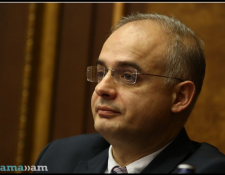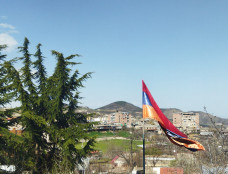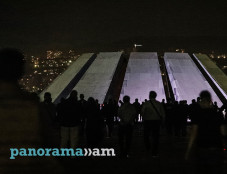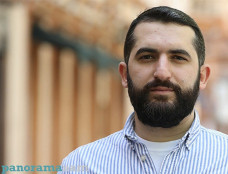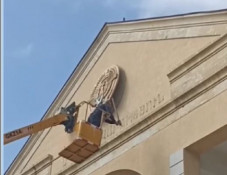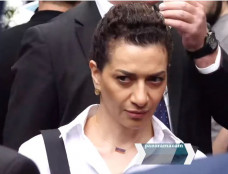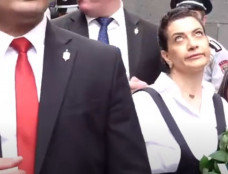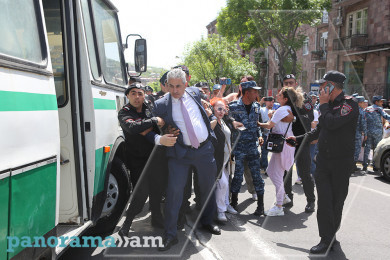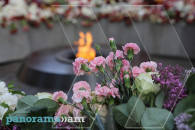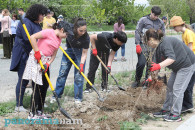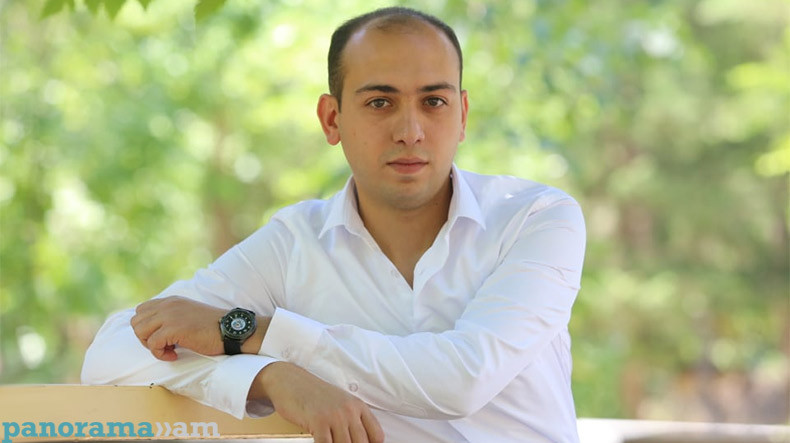
Meet military doctor Hrach Harutyunyan, who saved many lives during last year’s war in Artsakh
"... We also evacuated the dead bodies of soldiers and there were doctors who died at that time.”
Hrach Harutyunyan started his service in Artsakh (Nagorno-Karabakh) in 2018 after graduating from the Yerevan State Medical University named after Mkhitar Heratsi.
At his own request, he was appointed a doctor of the engineering-sapper military unit of Stepanakert. Later in March 2019 he moved to the Matagis military unit, starting to head its medical unit two months later.
The doctor’s only desire was to be on the frontline. “I wanted to be on the frontline, next to those who needed me. Why Matagis? Because doctors were needed there,” the military doctor said in an interview with Panorama.am.
Artsakh had attracted the doctor with its wonderful nature, but the war shattered it all, leaving everything unfinished.
Gaze of the wounded made doctors do the impossible
On September 27, the Azerbaijani military, with the support of Turkey and foreign mercenary terrorists, launched a large-scale offensive along the entire length of the Artsakh-Azerbaijan contact line, using its entire arsenal. The morning of September 27 was marked with the rumble of thousands of artillery and drone strikes in Artsakh.
The number of the wounded soldiers was immense and the doctors who found themselves in a difficult situation did everything possible to save their lives. The gaze of the wounded and the question whether they would live forced the doctors to do the impossible.
We talked to Hrach Harutyunyan about the days of the war, with the doctor clearly remembering each episode.
He says he always thought there would be war. The day before the outbreak of the war, they saw military equipment being deployed on the contact line, the battalion commanders reported about it, but there was no permission for the Armenian side to start an offensive. Why? The doctor constantly asks himself this question.
“In the morning we learned that in all areas the military officers' buildings were targeted first in shelling. Then we immediately started organizing the provision of medical assistance,” Harutyunyan says.
The doctor recalls that before the war there were 32 servicemen in the first-aid post sick with chickenpox and sore throat. On September 27, first of all, they took those soldiers to the rear and began to treat the wounded. Although it was unexpected, they tried to organize everything very quickly, because every second could be fatal for an 18-year-old soldier.
“At that time I felt a great responsibility, because I realized that the fate of the boys depended on me. The most difficult thing at that moment was that we had no means of communication, this problem emerged a few hours after the start of the war. We managed to get in touch with the commander, but not with the hospital staff. Then everything worked out. I must note that all the medical personnel worked in a cohesive and well-coordinated manner. Doctors, nurses, paramedics worked on an equal footing and without rest. For us there was no day or night,” says the 28-year-old doctor.
In addition to providing first aid, they evacuated wounded soldiers from the battlefield and the doctors were also on the verge of life and death.
The injuries were largely caused by mine explosions and large-caliber artillery shells, and there were also wounded with terrible burns as a result of UAV strikes.
“The first wounded was injured as a result of a drone strike, and several hours later soldiers with gunshot injuries were brought for treatment. Most of them were in grave and extremely grave condition. There were many of them,” the doctor says after heavy silence. He recalls the first wounded man, his friend Hovhannes, who succumbed to his serious injuries, the paramedics of the Talysh battalion were also wounded.
“We knew all the wounded. Although it was not our job, we also evacuated the dead bodies of soldiers. There were doctors who died at that time,” he says.
Even today, he clearly remembers those terrible days, noting 650 wounded servicemen were evacuated by their medical staff in Matagis alone in 5-6 days.
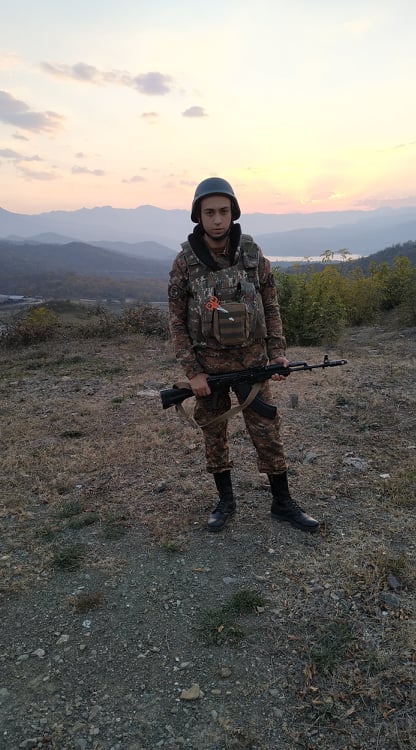
44-day nightmare, episode by episode
The doctor left Matagis on October 2.
“I and the paramedic were the last to left the town, following the commander and everyone else. At that moment we didn’t think we wouldn’t come back again. The enemy was only a few meters away, we only thought about transferring the wounded to a safe place. And then, when you realize what you have lost, of course, it's very hard,” he says.
The young doctor went to Matagis during the swap of bodies in November, and he experienced the greatest pain at this time, when he saw the places that he walked every day, the house in which he lived during the service, his car, the car of the commander broken and abandoned. And the most terrifying, irreversible loss is the loss of soldiers, his comrades.
He continues sharing his story, recalling the 44-day nightmare episode by episode.
“After we left Matagis, we spent the night outside, but we were able to take the wounded to the hospital. Then we went to Alashan, where we immediately admitted 17 servicemen injured in a Smerch attack. Afterwards, our staff went to the village of Varangatagh, where fierce battles were taking place. We were in constant contact with the doctors of the 5th defense district. We helped the wounded soldiers there and they came to our aid. I can state that the medical service was the only unit where everyone was in touch with each other,” says the young doctor.
From November 1, he and a paramedic worked in Martuni, where they were needed more. Hrach Harutyunyan recalls that they had serious problems with communication, they did not know what was happening in the neighboring military unit and the doctors there also did not know what situation they were in.
“I would not say that it was disorganized, we had great forces, there was just a lack of information. Firstly, we did not know what a Bayraktar drone was, the enemy could film us from above and then strike, but we did not have such an opportunity.
“Panic, as well as reservists, interfered strongly. For example, volunteers arrived and headed to military positions immediately after receiving weapons, but they did not know what to do, they hindered the activities. We had a lot of casualties because of them, because they weren't ready and didn't know what to do.
“There were cases when I moved the first-aid post to another place because of them, so that they would not interfere with us, but, thinking that the first-aid post should be in a safe place, they again went after us. The first-aid post in Mataghis came under a drone attack three times, causing many casualties. These people cannot be blamed, they were not prepared, did not know where they had come and what awaited them. Many thought that battles would last for several days as it was the case in the April war, but they came to realize that this was not the case. Unfortunately, we had a lot of victims among the reservists, too,” says the doctor.
However, the doctor and his staff did their best to help everyone. He recalls that on the first day of the war their car was hit in Talish, as a result of which the driver was wounded, but they continued to provide medical care. He is surprised how they managed to survive the attack.
We had to think straight, we had no other option
The White Army soldiers spent sleepless nights, saving many lives. The military doctor tried to think straight in those days. Naturally, everyone wanted to be saved, but the doctors were powerless. There were injuries incompatible with life.
Hrach Harutyunyan recalls how they tried to revive bodies covered with blood.
“There was a case when I just realized that it was impossible to save [the soldier], but we did our best for the soldier to live. Sometimes it was just a matter of seconds for us to save someone’s life, and there is nothing more important to me than this. We also assured everyone that they will be fine and help will come soon,” he says.
A large number of wounded were evacuated from Talish on the night of September 30. He remembers that the Armenian servicemen kept advancing, realizing that there was little chance for survival, but they did it for their families, friends and homeland.
Months after the war, when Hrach came to Yerevan for several days, people approached him on the streets and thanked him for saving their lives. They even thanked his parents.
Incidentally, in the beginning of the war, the doctor could not contact his parents, and when he did manage to call them, he had to calm them down, assuring that everything was fine.
“Do you know what is important to me? They never told me to return home, they just said, do what you think is right.”
Months after the war, the young doctor analyzes what happened, stating that the war should not have come as a surprise and the military should have been ready for it.
He also does not understand why people were provided with disinformation.
“During phone calls with my family members in those days, I asked for news and they said that the situation was good and our forces had advancement, but there was no such thing, there were cases when we took up new positions, but it was not always the case. Because of disinformation, we have what we have. After leaving Matagis, we realized that the war would last for a long time, and a few days later we no longer believed that all this would end and we would return home.”
.jpg)
He felt untold pain after November 9 tripartite statement
“After evacuating the wounded at 2am, we returned to the place of deployment. I received a call from my friend in Yerevan, who said, our lands were handed over. I felt terrible, defeated and humiliated, we had to suffer also the loss of the homeland after so many losses... But we also understood that it was impossible to continue this way.
“We were losing our soldiers, but there was no replenishment. We were exhausted. Our pain is immense; we have lost so many bright young men. And it is very difficult when you lose your homeland, when you think that you have done everything for this land, and now it is not yours. It hurts like hell. When you realize that the enemy holds the places where you lived and for which many sacrificed their lives. It's horrible.
“When I drive past Shushi and see their flag, every time I experience this pain anew, I cannot put it in words. How should a person who has lost his homeland feel?” he says.
I will never forget those eyes
Hrach Harutyunyan admits that during the entire wartime he felt nothing – no fear, no pain, all his feelings were numb, and the saddest thing was that death had become an ordinary thing for them.
“Once they brought a large number of wounded and one of the doctors approached one of them. The boy looked us in the eye and begged for life, but after a few seconds he passed away. I will never forget those eyes. This doctor came to me and burst into tears.
“I did not cry during the war, I restrained myself, otherwise I could not stand it all, naturally it was at the expense of my health,” the doctor says with a heavy heart, adding: “I definitely look at things differently now, but before I used to struggle with every problem I had for a long time. Now I say, it does not matter, there are more global problems that need to be addressed."
According to him, it is important to quickly restore the once strong Armenian army to avoid mistakes of the past and to investigate the circumstances of the 44-day war to reveal all the mistakes and omissions made.
“We had a strong army, and let no one try to argue otherwise. As for why we were defeated ... We really were weaker, it does not matter at what cost they achieved it all, be it the involvement of mercenaries, Turkish forces, etc. We were defeated in the most disgraceful manner.
“During the war, there were organizational issues which they mismanaged, the retreat was like an escape, because people did not know what to do, the commanders were killed and were not replaced, and people were left alone, not knowing what action to take. Most of the prisoners were captured by Azeri forces due to it, because they did not know that these territories were no longer ours and were encircled.
“I always wonder why our mountains were handed over to the enemy, including Kelbajar, which would have been impossible to capture. This means that our nation deserved it. Until we consolidate and unite around one idea, we will suffer more losses. And the saddest thing is that we have lost our motherland, and now we are losing the Armenian identity.
“I am from Syunik and live in Yerevan, but I will not allow Syunik to be handed over. I will fight for Syunik until my last breath. I miraculously survived and now I must fight for every inch of land,” says the military doctor.
Doctors saved lives at the cost of their own
Hrach Harutyunyan believes that it is necessary to prepare for the next war. Meanwhile, according to him, neither the army nor the people are ready for it.
“I say that the score is now 1:1, the winner will be the one who wins the next battle. This peace is relative, we must establish a lasting peace and we must get ready for it. We will never achieve peace without victory. We should not think that the Turks can be good or act in favor of our homeland. There has never been and will never be such a thing.
“All talks about a corridor must be ruled out, we must win and impose our terms. The army needs to be rebuilt, we have no time. It’s not normal when a soldier, doctor or villager negotiates with the Azeris crossing the border. We must build a state that would stand by every soldier and citizen,” the doctor says.
Hrach is not married and lives with his parents. In a few months he is to return to Yerevan to continue his studies and work in the capital. After the service, he thinks about getting married and wants to have several children.
The military doctor still has the opportunity to study abroad, while serving in Artsakh he received an offer to study in Texas, but turned it down, thinking if doctors like him leave the country, the medical service will face serious problems.
In recent years, the number of applicants entering the Faculty of Military Medicine of YSMU is pretty large. If there had been no war, the army would have been replenished with the necessary doctors. “When I started my service, we had a serious problem, but this year we would have had a 100% replenishment, but the war claimed the lives of more than a dozen doctors,” says Hrach Harutyunyan
The doctor’s only desire is for the participants in the war to be appreciated. Meanwhile, he says, the state glorifies those who do not deserve it. “There were people who fled, but then it turns out that they received medals. I was awarded with a medal “For Bravery” too, but I want to give it back, because many of those who really deserved it and saved lives did not receive any encouragement. Doctors must be appreciated, they saved lives at the cost of their own, without hiding in shelters. We should never forget about it,” he says.
After the war, the military doctor has no dreams, he now has only goals set before him, stating they can be reached only through hard work.
“I show everyone by my example that in this difficult time we should not leave Artsakh. Our people must eventually understand that indifference and failure to learn lessons will lead to more serious consequences. Unfortunately, the indifference is great. Yes, we shouldn't grieve all the time, we should continue living and celebrating weddings, birthdays, baptisms, but we should never forget our fallen soldiers,” the doctor says.
Photos from the personal archive of Hrach Harutyunyan
.jpg)
(1).jpg)
.jpg)
.jpg)
(1).jpg)
.jpg)
Newsfeed
Videos





